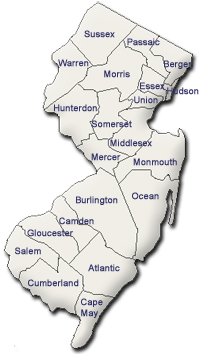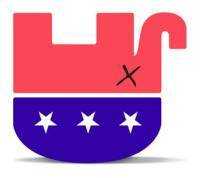Related Topics
Delaware (State of)
 Originally the "lower counties" of Pennsylvania, and thus one of three Quaker colonies founded by William Penn, Delaware has developed its own set of traditions and history.
Originally the "lower counties" of Pennsylvania, and thus one of three Quaker colonies founded by William Penn, Delaware has developed its own set of traditions and history.
Philadelphia Politics
Originally, politics had to do with the Proprietors, then the immigrants, then the King of England, then the establishment of the nation. Philadelphia first perfected the big-city political machine, which centers on bulk payments from utilities to the boss politician rather than small graft payments to individual office holders. More efficient that way.
..The Constitution
Our Constitution was not a proclamation written by a convention. It was a negotiated contract for uniting thirteen sovereign independent states. Nothing like that had ever been done voluntarily, and few nations have matched it in two hundred years, even with the use of force.
Philadelphia Economics
economics
Personal Finance
The rules of financial health are simple, but remarkably hard to follow. Be frugal in order to save, use your savings to buy the whole market not parts of it, if this system ain't broke, don't fix it. And don't underestimate your longevity.
Old Age
New topic 2019-04-09 16:04:33 description
New Jersey (State of)
 The Garden State really has two different states of mind. The motto is Liberty and Prosperity.
The Garden State really has two different states of mind. The motto is Liberty and Prosperity.
Government Organization
Government Organization
Right Angle Club 2010
2010 is coming to a close, a lame-duck session is upon us, and probably after that will come two years of gridlock. But the Philadelphia Men's Club called the Right Angle, keeps right on talking about the current scene. A few of these current contents relate to speeches given elsewhere.
..Constitution and Court
Forget all those lawyer jokes you hear. The American legal profession can rightly be proud of the Federal Court System, an achievement of the whole profession. America may be legalistic and overlawyered, but that reflects the rule of law dominated by lawyers. Curiously, the leader of this creation, John Marshall, was not so much a legal theoretician as a relentless Federalist lawyer, determined to reshape the legal profession to be worthy of power.
Go to Delaware, Elephants?

|
| Dead Elephant |
No one is supposed to know where elephants go to die, but if they are smart as people say they are, my suggestion is to search for dead elephants in the state of Delaware. Most taxes, and estate taxes, in particular, are considerably lower, there. At least this was the message Christopher J. Topolewski, Esq. conveyed to the Right Angle Club recently. His firm, West Capital Management, has prepared a table comparing the taxes in the three states that come together at the southeast corner of Pennsylvania, which for residents of the Philadelphia area are within easy commuting distance of each other. Although Delaware has a marriage penalty (one couple is taxed more than the sum of two singles), it has no estate tax at all, no sales tax, and a property tax rate only half that of Pennsylvania, only a quarter of that in New Jersey. For residents of New Jersey, there is almost no tax which is not lower in Delaware, because but ex-Pennsylvanians would then have to be careful to die or cohabit since ordinary income tax and capital gains taxes are higher in Delaware than Pennsylvania. If you must die (and who doesn't?), go die in Delaware.
This was a situation specifically contemplated as a way to discipline greedy state governments, by James Madison when he was formulating the U. S. Constitution. And there is evidence it is working. By happenstance, I once encountered an official of New Jersey taxation, who told me that 43% of New Jersey taxes are paid by 1% of the population. And that 1% was moving out of the state as fast as it could. If it does, the other 99% of New Jersey residents will find their taxes rising by 43%. West Capital reports that taxation as a percent of income is 1.23% in Delaware, 3.46% in Pennsylvania, and 5.82% in New Jersey, suggesting that a selective flight of the 1% would raise the state taxes of everyone else by 43%, and thus make state taxation as a percent of lowered average income rise to roughly 20%. Relating total income to total tax revenues would be an even better way to detect hidden indirect taxes, such as overtaxing utilities in the knowledge it will be passed on to the consumer. I recently discovered that a few years ago, the Legislature got tired of hearing complaints about local taxes, so they transferred half of the local taxes to the state tax. That's pretty much like taking it from one pocket and putting it into another because now all the hubbub is about state taxes. Armed with even partial information, it becomes easier to understand why New Jersey would evict a governor who had been Co-chairman of Goldman Sachs, during a financial crisis. If a financial whiz can't change this, maybe it requires a meat ax.
This is a time of growing restlessness about public spending, and Tea Party revolts are likely to accelerate during the remaining nine months before the next election. The conjecture is growing about a coming deadlock between a Republican Congress and a Democratic President, lasting at least two more years. What might emerge from a strong third party congressional delegation is too arcane to discuss. But at least the Republicans who leave can console themselves they are selectively raising the taxes of Democrats.
It seems almost inconceivable that professional politicians would demonstrate such a forest of tin ears as to let this happen, but the rest of Mr. Topolewski's talk just heated up the fire. His long-scheduled talk was designed to give guidance about the new estate tax laws, but he found himself confounding his audience with the news that there are no new estate tax laws; in fact, there will be no estate tax laws at all after this year unless they emerge from the congressional gridlock we already have. Which apparently will be followed by a gridlock we can scarcely imagine. Imagine asking your lawyer to write a will which straddles the contingencies that there will be no law, that there might be a continuation of the present one, or there might be some new law of quite uncertain wording. One of the suggestions offered is to allow your executor the discretion to accept or disclaim certain hypothetical provisions.
And that brings up an old story. William Penn was the largest private landowner in the history of America, possibly the whole world. He had a trusted agent, who gave him an enormous pile of papers to sign. A busy rich man like Penn is regularly confronted with a discouragingly large number of routine legal documents to sign. So, Penn signed them all, not noticing that one of the various papers in the pile gave the entire state of Pennsylvania -- to his agent. The outcome of the ensuing uproar was that Penn spent six years in debtors prison.
Originally published: Friday, February 19, 2010; most-recently modified: Wednesday, May 08, 2019
| Posted by: Doug Humes | Feb 22, 2010 12:00 PM |